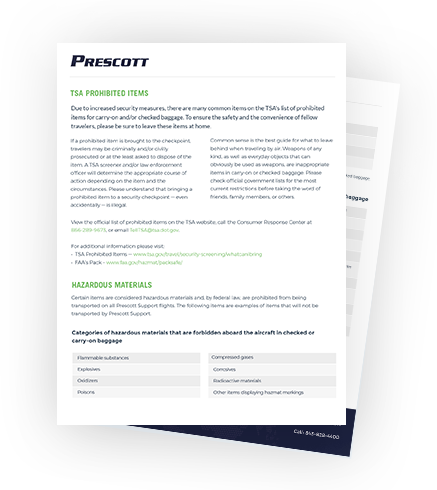
TSA PROHIBITED ITEMS
Due to increased security measures, there are many common items on the TSA’s list of prohibited items for carry-on and/or checked baggage. To ensure the safety and the convenience of fellow travelers, please be sure to leave these items at home.
If a prohibited item is brought to the checkpoint, travelers may be criminally and/or civilly prosecuted or at the least asked to dispose of the item. A TSA screener and/or law enforcement officer will determine the appropriate course of action depending on the item and the circumstances. Please understand that bringing a prohibited item to a security checkpoint — even accidentally — is illegal.
Common sense is the best guide for what to leave behind when traveling by air. Weapons of any kind, as well as everyday objects that can obviously be used as weapons, are inappropriate items in carry-on or checked baggage. Please check official government lists for the most current restrictions before taking the word of friends, family members, or others.
View the official list of prohibited items on the TSA website, call the Consumer Response Center at 866-289-9673, or email TellTSA@tsa.dot.gov. For additional information please visit:
- TSA Prohibited Items — www.tsa.gov/travel/security-screening/whatcanibring
- FAA’s Pack – www.faa.gov/hazmat/packsafe/
HAZARDOUS MATERIALS
Certain items are considered hazardous materials and, by federal law, are prohibited from being transported on all Prescott Support flights. The following items are examples of items that will not be transported by Prescott Support.
Categories of hazardous materials that are forbidden aboard the aircraft in checked or carry-on baggage |
|---|
| Flammable substances |
| Explosives |
| Oxidizers |
| Poisons |
| Compressed gases |
| Corrosives |
| Radioactive materials |
| Other items displaying hazmat markings |
Items that are allowed as carry-on only |
|---|
| E- Cigarettes / Vaping devices |
| One lighter or a single package of safety matches |
| Spare batteries |
| Portable charging devices / power banks / secondary charging devices |
| Note: If you are required to gate check your items, spare batteries must be removed. These items are not allowed in checked baggage. |
You must declare any hazardous materials or dangerous goods you are bring to the airline. Failure to do so violates U.S Federal Law. Violators may be subject to a maximum penalty of 5 years imprisonment and up to $250,000.00 in fines. ( 49 U.S.C 5124)
Examples of hazardous material forbidden aboard the aircraft in checked or carry-on baggage |
|---|
| Alcoholic beverages containing more than 70% (140 proof) alcohol by volume |
| Aerosols |
| Avalanche rescue packs |
| Chemical agent monitoring equipment |
| Chemical oxygen generators |
| Disabling devices containing an irritant or incapacitation substance (such as mace or pepper spray) |
| Electro shock weapons |
| Equipment with fuel sources (such as camping stoves, heaters, chain saws) |
| Equipment with internal combustion or fuel cell engines |
| Fireworks |
| Hydro carbon gas cartridges |
| Lithium batteries over 160 watt hours are forbidden in checked baggage (batteries with watt hours over 100 but less than 160 need airline approval) |
| Liquid fuels (e.g. gasoline, butane, lighter fluid) |
| Liquid oxygen |
| Oxygen bottles or cylinders |
| Pesticides |
| Samsung Galaxy Note 7 devices |
| Self-balancing scooter / hoverboard (contain lithium or lithium-ion batteries) |
| Self-defense spray/mace |
| Spillable Batteries (unless it is for wheel chair/ mobility aid) |
| Spray starch |
| Strike anywhere matches |
| Smart Luggage with non-removeable batteries |

